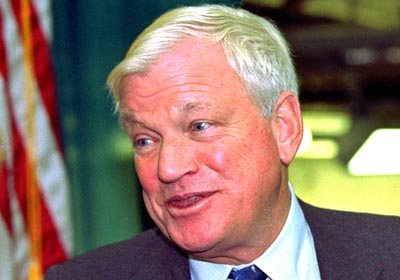Pittsburgh philanthropist and reclusive heir to the Mellon banking fortune
Richard Mellon Scaife was born in Pittsburgh on July 3, 1932, one of two children of Alan Magee Scaife and Sarah Cordelia Mellon Scaife. His father was the scion of a Pittsburgh steel family, and his mother was the daughter of Richard B. Mellon, who made fortunes in banking and oil, and a niece of Andrew W. Mellon, the treasury secretary in the Harding, Coolidge and Hoover administrations. Richard, known as Dickie, and his sister, Cordelia, grew up on the family estate, Penguin Court, in Ligonier, Pa. He suffered a fractured skull in a horse-riding accident when he was 9, and spent a year in bed, mostly reading newspapers. He graduated from Deerfield Academy in Massachusetts. But at Yale he was suspended for drunken pranks, then expelled in his first year. He later attended the University of Pittsburgh, where his father was chairman of the trustees, and in 1957 graduated with a degree in English. In 1956, he married Frances L. Gilmore. They had two children, Jennie and David, and were divorced in 1991. Later that year, he married his longtime companion, Margaret (Ritchie) Battle. They were separated in 2005 under a settlement that awarded her $725,000 a month from her husband’s fortune, then estimated at $1.4 billion. After his father died in 1958, Mr. Scaife took his seats on corporate boards, but was given little to do in the family business, which was controlled by his uncle, R. K. Mellon. His mother, who backed medical and environmental causes, family planning and charities for the poor and disabled, encouraged his interest in philanthropy. He distributed money through the Sarah Scaife, Carthage and Allegheny Foundations. In the 1970s, Mr. Scaife bought several newspapers, including The Tribune-Review in Greensburg, Pa., southeast of Pittsburgh. He spent lavishly to turn it into a metropolitan paper marketed as The Pittsburgh Tribune-Review. Disillusioned by Watergate and Nixon, he switched his focus from officeholders to ideologies, and his influence in the rise of neoconservatism stemmed primarily from his contributions to think tanks, lobbyists and publications that promoted free-market economics, lower taxes, smaller government and cuts in social welfare programs. Beneficiaries included the Heritage Foundation, the Cato Institute, the American Enterprise Institute and Judicial Watch. He also gave to the Pittsburgh Symphony Orchestra, the Carnegie Institute, the National Gallery of Art, museums, hospitals, the Corporation for Public Broadcasting and Planned Parenthood.
